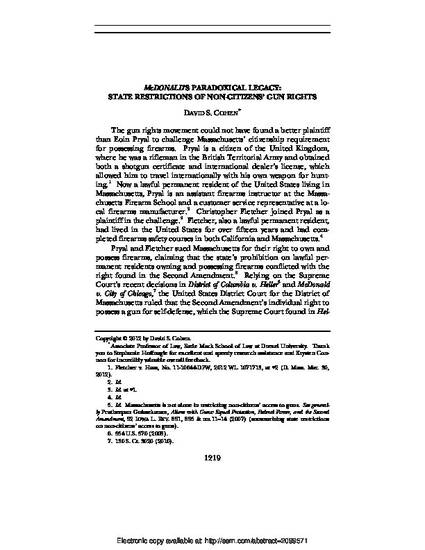
Article
McDonald's Paradoxical Legacy: State Restrictions on Non-Citizens' Gun Rights
Maryland Law Review
(2012)
Abstract
Relying on the Supreme Court's recent decisions in District of Columbia v. Heller and McDonald v. City of Chicago, the United States District Court for the District of Massachusetts recently ruled that the Second Amendment's individual right to possess a gun for self-defense, which the Supreme Court found in Heller and incorporated against the states in McDonald, protected a lawful permanent resident's right to bear arms and that the Massachusetts statutory scheme with respect to non-citizens violated that right. The district court found that the Second Amendment applies to non-citizens because the court read McDonald as incorporating the Second Amendment through the Due Process Clause, which protects against states infringing on the rights of "persons." However, the court erred when it ignored the voting paradox within the McDonald decision. This Essay attempts to resolve McDonald's paradox in the context of non-citizens by applying a modification of the familiar rule for dealing with fragmented Supreme Court opinions. Under that modified rule, there is no basis for finding that the Second Amendment, applied to the states through the Fourteenth Amendment, protects non-citizens from gun restrictions. There may be other reasons to find that states cannot restrict non-citizens from owning or possessing firearms, but based on Supreme Court precedent, incorporation of a fundamental right is not one of them.
Keywords
- McDonald,
- voting paradox,
- non-citizens,
- Second Amendment
Disciplines
Publication Date
2012
Citation Information
David S Cohen. "McDonald's Paradoxical Legacy: State Restrictions on Non-Citizens' Gun Rights" Maryland Law Review Vol. 71 (2012) p. 1219 - 1230 Available at: http://works.bepress.com/david_cohen/22/
